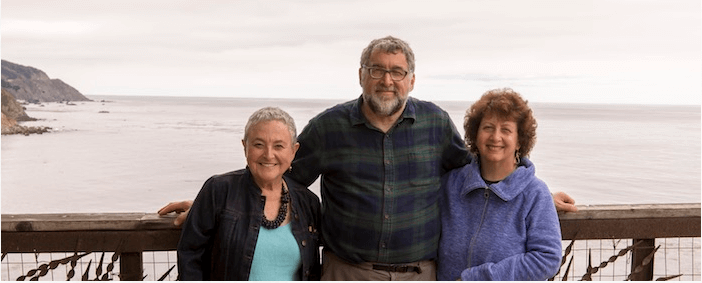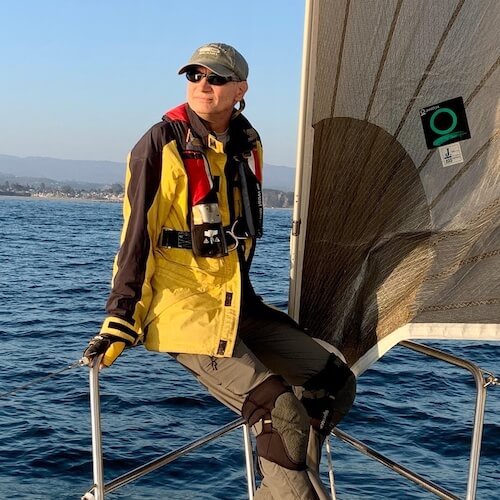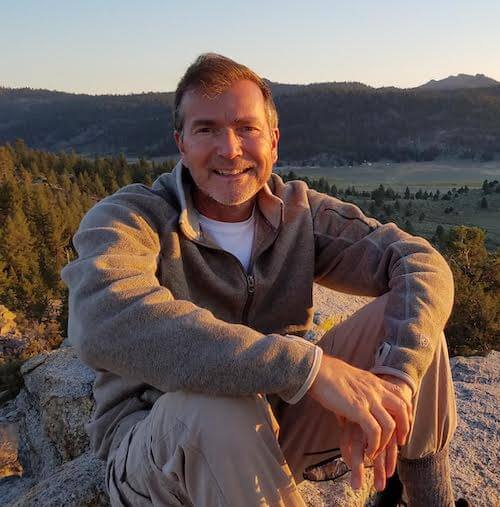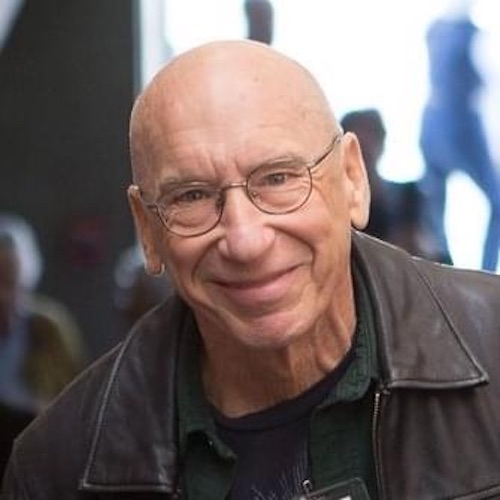
Many of us have experienced the power of music to influence our mood; now new research points to the positive impact listening to music can have on reducing the level of the stress hormone cortisol. Many of us have experienced the power of music to influence our mood; now new research points to the positive impact listening to music can have on reducing the level of the stress hormone cortisol in our brain. In the upcoming Esalen workshop, Tuning Your Instrument: The Buddha, the Brain, and Bach, cellist Barbara Bogatin and her husband, neuroscientist Clifford Saron, explore the intersections of music, meditation, and the mind. The seeds of the workshop were planted three decades ago when Barbara and Clifford were first dating.
“Cliff and I were just dating and he thought attending a meditation retreat would be a great thing to do,” recalls Barbara who is a graduate of the Juilliard School and has performed with the San Francisco Symphony for the last 22 years. “The idea of sitting on a cushion for 10 days in silence wasn’t appealing to me at first, but I decided to give it a try.” As it turned out, Barbara’s first introduction to meditation would be led by Joseph Goldstein, Jack Kornfield, and Sharon Salzberg at the Insight Meditation Center in Barre, Massachusetts.
“The first thing I noticed was that the instructions sounded familiar to me,” says Barbara. “Quiet your mind, listen deeply to the sounds around you, follow your breath, and cultivate a neutral awareness of just what is present: this sounded a lot like what I do when I sit down to practice the cello.” In fact, according to Barbara, musicians are very conscious of their breath and practice non-judgment in listening to their music in order to be critical of the sound and not the self.
While music and meditation were often part of many dinner conversations between Barbara and Cliff, the idea of an actual workshop grew from research Cliff was conducting on the effect of meditation on the brain. He approached founding teacher of Spirit Rock Meditation Center Sylvia Boorstein to recruit participants for his study. Subsequently the three taught at a Spirit Rock event. “This was the first time we all worked together and integrated our various experiences. We learned so much from each other.”
The upcoming Esalen workshop is called Tuning Your Instrument as it speaks to both Barbara’s musical and meditative practices. Each day of the workshop begins with music. Bach is the perfect composer to feature, says Barbara. “There is so much variety and types of movements – some exuberant and others soulful and reflective.” What’s more, Barbara perceives a spiritual aspect to the composer’s work in addition to an emotional one. “He is not one of the composers to wear his heart on a sleeve,” she observes. “There is a slight emotional distance in his music: I feel your pain, but I am not your pain.”
Sylvia leads workshop participants in various meditations while Cliff presents new findings in meditation research related to how our brain functions, particularly its ability to adapt and change. “Cliff talks about neuroplasticity and will use my brain as an example in how it has changed due to thousands of hours of practicing the cello,” says Barbara. For many cellists like Barbara, a cellist’s bow begins to feel like part of the body and musicians feel an incredible control over this tool. Cliff then shares the findings of an experiment with primates where a rake used to acquire food becomes such an integral part of them that for some parts of the monkey’s brain, the end of the rake is represented in the same brain location that had represented the end of the monkey’s fingers.
Barbara also walks workshop participants through a piece of music. “I’ll deconstruct the music and show how I practice it as if it were a meditation: slowing down the mind and observing thoughts.” In fact, Barbara will often meditate before a musical performance to be, as she describes, in a more open-hearted space where she can express herself more fully.
Ultimately, Barbara hopes workshop participants will discover how practice (whether meditative or musical) can be done in a more conscious way. “To rise to a level of mastery you have to be very conscious of how you practice,” says Barbara. By learning the science behind how our brain functions, she adds, we can better understand who we are as human beings.
Learn more about Tuning Your Instrument.

“Remembering to be as self compassionate as I can and praying to the divine that we're all a part of.”
–Aaron
“Prayer, reading, meditation, walking.”
–Karen
“Erratically — which is an ongoing stream of practice to find peace.”
–Charles
“Try on a daily basis to be kind to myself and to realize that making mistakes is a part of the human condition. Learning from our mistakes is a journey. But it starts with compassion and caring. First for oneself.”
–Steve
“Physically: aerobic exercise, volleyball, ice hockey, cycling, sailing. Emotionally: unfortunately I have to work to ‘not care’ about people or situations which may end painfully. Along the lines of ‘attachment is the source of suffering’, so best to avoid it or limit its scope. Sad though because it could also be the source of great joy. Is it worth the risk?“
–Rainer


“It's time for my heart to be nurtured on one level yet contained on another. To go easy on me and to allow my feelings to be validated, not judged harshly. On the other hand, to let the heart rule with equanimity and not lead the mind and body around like a master.”
–Suzanne
“I spend time thinking of everything I am grateful for, and I try to develop my ability to express compassion for myself and others without reservation. I take time to do the things I need to do to keep myself healthy and happy. This includes taking experiential workshops, fostering relationships, and participating within groups which have a similar interest to become a more compassionate and fulfilled being.“
–Peter


“Self-forgiveness for my own judgments. And oh yeah, coming to Esalen.”
–David B.
“Hmm, this is a tough one! I guess I take care of my heart through fostering relationships with people I feel connected to. Spending quality time with them (whether we're on the phone, through messages/letters, on Zoom, or in-person). Being there for them, listening to them, sharing what's going on with me, my struggles and my successes... like we do in the Esalen weekly Friends of Esalen Zoom sessions!”
–Lori

“I remind myself in many ways of the fact that " Love is all there is!" LOVE is the prize and this one precious life is the stage we get to learn our lessons. I get out into nature, hike, camp, river kayak, fly fish, garden, I create, I dance (not enough!), and I remain grateful for each day, each breath, each moment. Being in the moment, awake, and remembering the gift of life and my feeling of gratitude for all of creation.”
–Steven
“My physical heart by limiting stress and eating a heart-healthy diet. My emotional heart by staying in love with the world and by knowing that all disappointment and loss will pass.“
–David Z.
Today, September 29, is World Heart Day. Strike up a conversation with your own heart and as you feel comfortable, encourage others to do the same. As part of our own transformations and self-care, we sometimes ask for others to illuminate and enliven our hearts or speak our love language.
What if we could do this for ourselves too, even if just for today… or to start a heart practice, forever?

Many of us have experienced the power of music to influence our mood; now new research points to the positive impact listening to music can have on reducing the level of the stress hormone cortisol. Many of us have experienced the power of music to influence our mood; now new research points to the positive impact listening to music can have on reducing the level of the stress hormone cortisol in our brain. In the upcoming Esalen workshop, Tuning Your Instrument: The Buddha, the Brain, and Bach, cellist Barbara Bogatin and her husband, neuroscientist Clifford Saron, explore the intersections of music, meditation, and the mind. The seeds of the workshop were planted three decades ago when Barbara and Clifford were first dating.
“Cliff and I were just dating and he thought attending a meditation retreat would be a great thing to do,” recalls Barbara who is a graduate of the Juilliard School and has performed with the San Francisco Symphony for the last 22 years. “The idea of sitting on a cushion for 10 days in silence wasn’t appealing to me at first, but I decided to give it a try.” As it turned out, Barbara’s first introduction to meditation would be led by Joseph Goldstein, Jack Kornfield, and Sharon Salzberg at the Insight Meditation Center in Barre, Massachusetts.
“The first thing I noticed was that the instructions sounded familiar to me,” says Barbara. “Quiet your mind, listen deeply to the sounds around you, follow your breath, and cultivate a neutral awareness of just what is present: this sounded a lot like what I do when I sit down to practice the cello.” In fact, according to Barbara, musicians are very conscious of their breath and practice non-judgment in listening to their music in order to be critical of the sound and not the self.
While music and meditation were often part of many dinner conversations between Barbara and Cliff, the idea of an actual workshop grew from research Cliff was conducting on the effect of meditation on the brain. He approached founding teacher of Spirit Rock Meditation Center Sylvia Boorstein to recruit participants for his study. Subsequently the three taught at a Spirit Rock event. “This was the first time we all worked together and integrated our various experiences. We learned so much from each other.”
The upcoming Esalen workshop is called Tuning Your Instrument as it speaks to both Barbara’s musical and meditative practices. Each day of the workshop begins with music. Bach is the perfect composer to feature, says Barbara. “There is so much variety and types of movements – some exuberant and others soulful and reflective.” What’s more, Barbara perceives a spiritual aspect to the composer’s work in addition to an emotional one. “He is not one of the composers to wear his heart on a sleeve,” she observes. “There is a slight emotional distance in his music: I feel your pain, but I am not your pain.”
Sylvia leads workshop participants in various meditations while Cliff presents new findings in meditation research related to how our brain functions, particularly its ability to adapt and change. “Cliff talks about neuroplasticity and will use my brain as an example in how it has changed due to thousands of hours of practicing the cello,” says Barbara. For many cellists like Barbara, a cellist’s bow begins to feel like part of the body and musicians feel an incredible control over this tool. Cliff then shares the findings of an experiment with primates where a rake used to acquire food becomes such an integral part of them that for some parts of the monkey’s brain, the end of the rake is represented in the same brain location that had represented the end of the monkey’s fingers.
Barbara also walks workshop participants through a piece of music. “I’ll deconstruct the music and show how I practice it as if it were a meditation: slowing down the mind and observing thoughts.” In fact, Barbara will often meditate before a musical performance to be, as she describes, in a more open-hearted space where she can express herself more fully.
Ultimately, Barbara hopes workshop participants will discover how practice (whether meditative or musical) can be done in a more conscious way. “To rise to a level of mastery you have to be very conscious of how you practice,” says Barbara. By learning the science behind how our brain functions, she adds, we can better understand who we are as human beings.
Learn more about Tuning Your Instrument.

“Remembering to be as self compassionate as I can and praying to the divine that we're all a part of.”
–Aaron
“Prayer, reading, meditation, walking.”
–Karen
“Erratically — which is an ongoing stream of practice to find peace.”
–Charles
“Try on a daily basis to be kind to myself and to realize that making mistakes is a part of the human condition. Learning from our mistakes is a journey. But it starts with compassion and caring. First for oneself.”
–Steve
“Physically: aerobic exercise, volleyball, ice hockey, cycling, sailing. Emotionally: unfortunately I have to work to ‘not care’ about people or situations which may end painfully. Along the lines of ‘attachment is the source of suffering’, so best to avoid it or limit its scope. Sad though because it could also be the source of great joy. Is it worth the risk?“
–Rainer


“It's time for my heart to be nurtured on one level yet contained on another. To go easy on me and to allow my feelings to be validated, not judged harshly. On the other hand, to let the heart rule with equanimity and not lead the mind and body around like a master.”
–Suzanne
“I spend time thinking of everything I am grateful for, and I try to develop my ability to express compassion for myself and others without reservation. I take time to do the things I need to do to keep myself healthy and happy. This includes taking experiential workshops, fostering relationships, and participating within groups which have a similar interest to become a more compassionate and fulfilled being.“
–Peter


“Self-forgiveness for my own judgments. And oh yeah, coming to Esalen.”
–David B.
“Hmm, this is a tough one! I guess I take care of my heart through fostering relationships with people I feel connected to. Spending quality time with them (whether we're on the phone, through messages/letters, on Zoom, or in-person). Being there for them, listening to them, sharing what's going on with me, my struggles and my successes... like we do in the Esalen weekly Friends of Esalen Zoom sessions!”
–Lori

“I remind myself in many ways of the fact that " Love is all there is!" LOVE is the prize and this one precious life is the stage we get to learn our lessons. I get out into nature, hike, camp, river kayak, fly fish, garden, I create, I dance (not enough!), and I remain grateful for each day, each breath, each moment. Being in the moment, awake, and remembering the gift of life and my feeling of gratitude for all of creation.”
–Steven
“My physical heart by limiting stress and eating a heart-healthy diet. My emotional heart by staying in love with the world and by knowing that all disappointment and loss will pass.“
–David Z.
Today, September 29, is World Heart Day. Strike up a conversation with your own heart and as you feel comfortable, encourage others to do the same. As part of our own transformations and self-care, we sometimes ask for others to illuminate and enliven our hearts or speak our love language.
What if we could do this for ourselves too, even if just for today… or to start a heart practice, forever?

Many of us have experienced the power of music to influence our mood; now new research points to the positive impact listening to music can have on reducing the level of the stress hormone cortisol. Many of us have experienced the power of music to influence our mood; now new research points to the positive impact listening to music can have on reducing the level of the stress hormone cortisol in our brain. In the upcoming Esalen workshop, Tuning Your Instrument: The Buddha, the Brain, and Bach, cellist Barbara Bogatin and her husband, neuroscientist Clifford Saron, explore the intersections of music, meditation, and the mind. The seeds of the workshop were planted three decades ago when Barbara and Clifford were first dating.
“Cliff and I were just dating and he thought attending a meditation retreat would be a great thing to do,” recalls Barbara who is a graduate of the Juilliard School and has performed with the San Francisco Symphony for the last 22 years. “The idea of sitting on a cushion for 10 days in silence wasn’t appealing to me at first, but I decided to give it a try.” As it turned out, Barbara’s first introduction to meditation would be led by Joseph Goldstein, Jack Kornfield, and Sharon Salzberg at the Insight Meditation Center in Barre, Massachusetts.
“The first thing I noticed was that the instructions sounded familiar to me,” says Barbara. “Quiet your mind, listen deeply to the sounds around you, follow your breath, and cultivate a neutral awareness of just what is present: this sounded a lot like what I do when I sit down to practice the cello.” In fact, according to Barbara, musicians are very conscious of their breath and practice non-judgment in listening to their music in order to be critical of the sound and not the self.
While music and meditation were often part of many dinner conversations between Barbara and Cliff, the idea of an actual workshop grew from research Cliff was conducting on the effect of meditation on the brain. He approached founding teacher of Spirit Rock Meditation Center Sylvia Boorstein to recruit participants for his study. Subsequently the three taught at a Spirit Rock event. “This was the first time we all worked together and integrated our various experiences. We learned so much from each other.”
The upcoming Esalen workshop is called Tuning Your Instrument as it speaks to both Barbara’s musical and meditative practices. Each day of the workshop begins with music. Bach is the perfect composer to feature, says Barbara. “There is so much variety and types of movements – some exuberant and others soulful and reflective.” What’s more, Barbara perceives a spiritual aspect to the composer’s work in addition to an emotional one. “He is not one of the composers to wear his heart on a sleeve,” she observes. “There is a slight emotional distance in his music: I feel your pain, but I am not your pain.”
Sylvia leads workshop participants in various meditations while Cliff presents new findings in meditation research related to how our brain functions, particularly its ability to adapt and change. “Cliff talks about neuroplasticity and will use my brain as an example in how it has changed due to thousands of hours of practicing the cello,” says Barbara. For many cellists like Barbara, a cellist’s bow begins to feel like part of the body and musicians feel an incredible control over this tool. Cliff then shares the findings of an experiment with primates where a rake used to acquire food becomes such an integral part of them that for some parts of the monkey’s brain, the end of the rake is represented in the same brain location that had represented the end of the monkey’s fingers.
Barbara also walks workshop participants through a piece of music. “I’ll deconstruct the music and show how I practice it as if it were a meditation: slowing down the mind and observing thoughts.” In fact, Barbara will often meditate before a musical performance to be, as she describes, in a more open-hearted space where she can express herself more fully.
Ultimately, Barbara hopes workshop participants will discover how practice (whether meditative or musical) can be done in a more conscious way. “To rise to a level of mastery you have to be very conscious of how you practice,” says Barbara. By learning the science behind how our brain functions, she adds, we can better understand who we are as human beings.
Learn more about Tuning Your Instrument.

“Remembering to be as self compassionate as I can and praying to the divine that we're all a part of.”
–Aaron
“Prayer, reading, meditation, walking.”
–Karen
“Erratically — which is an ongoing stream of practice to find peace.”
–Charles
“Try on a daily basis to be kind to myself and to realize that making mistakes is a part of the human condition. Learning from our mistakes is a journey. But it starts with compassion and caring. First for oneself.”
–Steve
“Physically: aerobic exercise, volleyball, ice hockey, cycling, sailing. Emotionally: unfortunately I have to work to ‘not care’ about people or situations which may end painfully. Along the lines of ‘attachment is the source of suffering’, so best to avoid it or limit its scope. Sad though because it could also be the source of great joy. Is it worth the risk?“
–Rainer


“It's time for my heart to be nurtured on one level yet contained on another. To go easy on me and to allow my feelings to be validated, not judged harshly. On the other hand, to let the heart rule with equanimity and not lead the mind and body around like a master.”
–Suzanne
“I spend time thinking of everything I am grateful for, and I try to develop my ability to express compassion for myself and others without reservation. I take time to do the things I need to do to keep myself healthy and happy. This includes taking experiential workshops, fostering relationships, and participating within groups which have a similar interest to become a more compassionate and fulfilled being.“
–Peter


“Self-forgiveness for my own judgments. And oh yeah, coming to Esalen.”
–David B.
“Hmm, this is a tough one! I guess I take care of my heart through fostering relationships with people I feel connected to. Spending quality time with them (whether we're on the phone, through messages/letters, on Zoom, or in-person). Being there for them, listening to them, sharing what's going on with me, my struggles and my successes... like we do in the Esalen weekly Friends of Esalen Zoom sessions!”
–Lori

“I remind myself in many ways of the fact that " Love is all there is!" LOVE is the prize and this one precious life is the stage we get to learn our lessons. I get out into nature, hike, camp, river kayak, fly fish, garden, I create, I dance (not enough!), and I remain grateful for each day, each breath, each moment. Being in the moment, awake, and remembering the gift of life and my feeling of gratitude for all of creation.”
–Steven
“My physical heart by limiting stress and eating a heart-healthy diet. My emotional heart by staying in love with the world and by knowing that all disappointment and loss will pass.“
–David Z.
Today, September 29, is World Heart Day. Strike up a conversation with your own heart and as you feel comfortable, encourage others to do the same. As part of our own transformations and self-care, we sometimes ask for others to illuminate and enliven our hearts or speak our love language.
What if we could do this for ourselves too, even if just for today… or to start a heart practice, forever?